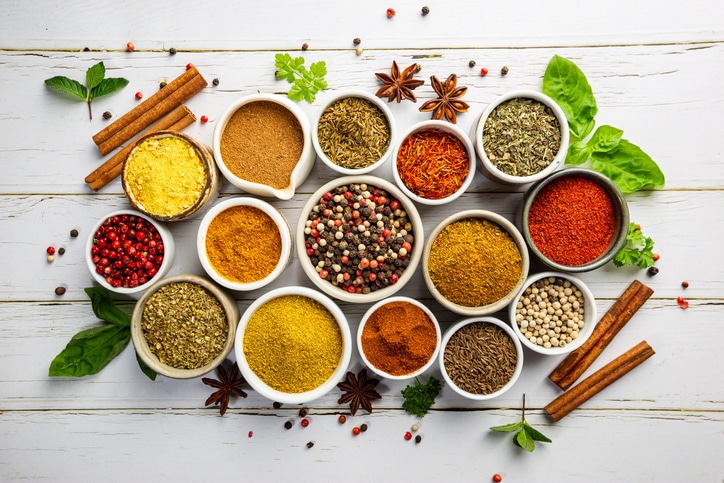Herbs and spices have been used for centuries to flavor food and improve health. Modern research confirms that they are powerful natural health boosters, helping to protect us from a wide range of serious conditions, including heart disease, stroke, cancer, diabetes, dementia, and depression.[1]
That’s why new testing from Consumer Reports is so disturbing. It shows that some commercial herbs and spices may actually damage your health.
The magazine tested 126 herbs and spices from popular stores like Walmart and Trader Joe’s. It found that 40 had high levels of the heavy metals arsenic, lead, and cadmium.
Frequent exposure to even small amounts of these metals is dangerous. This is because it’s hard for our bodies to break them down. So they accumulate in our tissue. Arsenic, lead, and cadmium are linked to high blood pressure, kidney disorders, nervous system problems, and poor immune system function. In children, they can affect brain development, lowering IQs.[2]
How Do Heavy Metals Get into Herbs and Spices?
Dr. James E. Rogers led the testing. “When people think about heavy metals in their diet, it’s probably lead in their drinking water or arsenic in children’s fruit juices or cereals,” he said. “But our tests show that dried herbs and spices can be a surprising, and worrisome, source.”[3]
The Consumer Reports test ranked products from least to most concern. Here are herb and spice brands that ranked as moderate or high concern:
- La Flor Ground Oregano
- La Flor Ground Turmeric
- Happy Belly Ground Thyme (from Amazon)
- Spice Islands Sweet Basil
- Tone’s Ground Thyme
Almost all brands of basil, ginger, oregano, and thyme were found to have problematic metal levels. The exception was basil and ginger from the brand Simply Organic.[4]
Other types of herbs and spices had almost no problematic readings at all. They include:
- Black pepper
- Chili pepper
- Coriander
- Curry powder
- Garlic powder
- Saffron
- Sesame seed
- White pepper
For a full list of the test results, go HERE.
Herbs and spices get contaminated with heavy metals in different ways, Dr. Rogers said. Plants can suck up lead in the soil and groundwater where they are grown. Metals can also leach into herbs and spices during factory processing. In some cases outside the U.S., processors have actually been known to add lead to boost color to make spices look fresher and more appetizing.[5]
4 Ways to Protect Yourself and Your Family
- Stay away from commercial basil, ginger, oregano, and thyme. They are more likely to be contaminated than other herbs and spices.
- Feature these herbs and spices in your cooking: black pepper, chili pepper, coriander, curry powder, garlic powder, saffron, sesame seeds, and white pepper. They are all low risk.
- Grow your own. Basil, oregano, and thyme are relatively easy to grow in pots. An indoor windowsill or outdoor space that stays above 40 degrees will do, as long as it gets six hours or more of sunlight a day. To dry herbs, tie together a 1-inch diameter bunch. Hang the bunches upside down in a dark, dry location. After the leaves dry, crumble them into a container.[6]
- Buy U.S. products. Foreign-grown or packed products are more likely to be contaminated.
The risk of heavy metals is real, but it doesn’t mean you’re doomed to a life of bland food. Following the guidelines above allows you to minimize your risk without sacrificing flavor or the health benefits of herbs and spices.
Editor’s Note: Unlike much of the mainstream media, we don’t accept advertising from Big Pharma. That’s why you can count on us for unbiased medical information. Our only motivation is your good health. Subscribe to our newsletter, Independent Healing. Each month it brings you important health news you won’t find anywhere else. To subscribe, go HERE.
Related Articles
Some Sanitizers Are Contaminated with Powerful Carcinogen, Test Shows
How to Stay Away from the “Everywhere Chemical”
Cancer-Causing Chemical Found in Popular Sunscreens
[1] https://pubmed.ncbi.nlm.nih.gov/30651162/
[2] https://www.frontiersin.org/articles/10.3389/fphar.2021.643972/full
[3] https://www.consumerreports.org/food-safety/your-herbs-and-spices-might-contain-arsenic-cadmium-and-lead/
[4] https://www.popularmechanics.com/home/food-drink/a38413337/heavy-metals-found-in-herbs-spices/
[5] https://www.sciencedaily.com/releases/2019/09/190924101446.htm
[6] https://www.thespruceeats.com/harvesting-and-drying-leafy-herbs-1327541

